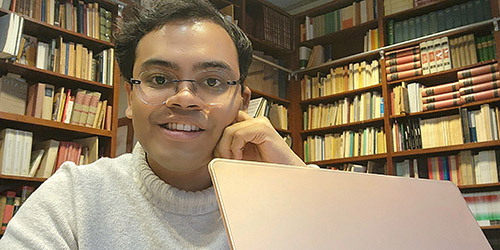Location: India, USA
Adrian Dsouza, a Masters student in Computer Science at New York University, traces much of his personal growth and academic and professional success back to the broad skills he developed through his early experiences with taking graded music qualifications from Trinity College London.
Born and raised in Mumbai India, Adrian first encountered music through his grandfather, a passionate multi-instrumentalist who played piano, saxophone and clarinet. Though he admired his grandfather’s musicality, Adrian wasn’t immediately drawn to music himself but that changed during his teenage years. Encouraged by his parents he began taking electronic keyboard lessons and alongside his teacher decided to pursue graded music exams.
Wanting to have a clear structure and sense of progression, Adrian began preparing for graded music exams using the Trinity syllabus and over the next few years, he completed Grades 1 and 3 in electronic keyboard and Grade 2 theory of music. “Trinity’s graded exams gave me something tangible to aim for,” he says. “The syllabus was well-structured and flexible, which made the process less intimidating and more personal. I wasn’t just playing notes - I was understanding music and enjoying it!”
For Adrian, initially the motivation was about passing and receiving his certificates but as he reflects, he can see that it was also a means of building discipline and resilience. Practising regularly for weeks leading up to each exam taught him about commitment, long-term focus and how to handle setbacks constructively.
“I’d often get frustrated when I couldn’t get a piece right, but learning to keep going despite that was important. It’s the same mindset I need when debugging complicated code or working on long-term academic projects in my studies and career now.”
Interestingly, Adrian sees a strong connection between music and engineering and computer science. “They’re both languages in a way. Music theory and programming logic both rely on patterns, rules, and a certain level of creativity. I often find that the way I approach a new piece of music - breaking it down, understanding its structure - is very similar to how I approach writing or analysing code.”
Preparing for these Trinity qualifications taught Adrian not only discipline but how to focus and the importance of regular practice - skills he now finds crucial in his studies and his work as a developer. “Just like practising scales and chord progressions,” he explains, “programming requires daily engagement with code, algorithms and problem-solving. If you step away for a while, it takes effort to get back in rhythm.”
Another aspect of Trinity’s music exams that made a lasting impact was the performance element. Preparing for a live exam helped Adrian develop his self-confidence, especially in high-pressure situations. “Walking into a room and performing for an examiner was nerve-wracking at first,” he admits. “But over time, it taught me how to perform in front of an audience, take feedback positively, stay calm under pressure and keep improving - skills that have helped me in everything from giving class presentations to participating in job interviews.”
Beyond technical skills, music helped Adrian grow as a team player. He was able to participate in his local church through playing music and in his church’s choir, where collaboration was key. “Making music with others taught me about listening carefully, adapting in the moment and valuing each person’s contribution,” he says. “These are exactly the kinds of soft skills that are essential when working in project teams - especially in tech, where you’re often solving problems together.”
Adrian also believes that his musical background gave him an edge when applying to university as it was a differentiating factor in his NYU application, showcasing his creativity and well-rounded background.
“Having Trinity exams on my application showed that I wasn’t just academically inclined - I had a creative outlet, and I understood how to work hard toward long-term goals. It gives me something unique to talk about in my personal statement and in interviews.”
Today, Adrian is immersed in his graduate studies, exploring areas like machine learning, data structures and artificial intelligence. His days are filled with writing code, attending lectures and collaborating on software projects. But music hasn’t disappeared from his life. “Music is still a part of who I am. It shaped how I think, how I work and how I express myself.” He’s still passionate about it and is planning to learn guitar while in New York. “It’s a great way to de-stress and connect with people. I’d love to start a jam group with other students - just for fun!”
Looking back, Adrian is grateful for the role Trinity exams played in shaping his personal and academic development. “Trinity College London gave me so much more than just a musical education. It has helped me understand the value of steady progress, taught me how to perform under pressure and gave me confidence in my ability to learn and grow.”
His message to other young people considering Trinity exams is clear:
“Do it. The skills you learn go far beyond music and stay with you for life - even if you don’t see it right away - skills that will help you in school, in work and in life.”
Follow Adrian Dsouza on his LinkedIn page.
